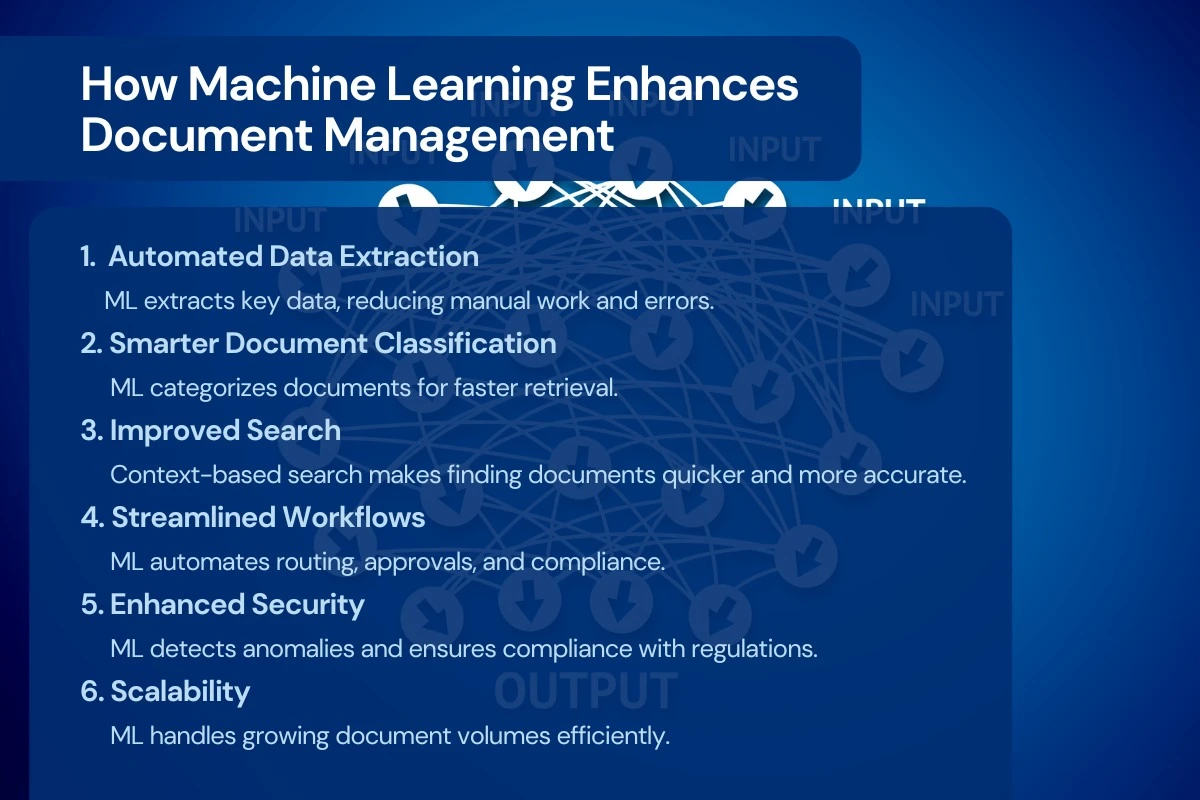Role of Machine Learning in Streamlining Document Management

Streamlining document management plays an important role in enhancing the efficiency of an organization while driving business growth. Document management software has undergone significant changes, and the integration of advanced technologies like machine learning has transformed the way organizations manage documents. Let’s dive into how machine learning is revolutionizing document management and enhancing productivity.
1. Automated Data Extraction
The machine learning algorithms are able to rapidly extract data from documents. These can be invoices, contracts, or reports. ML tools identify patterns, extract specific details, and organize them into structured formats. This greatly reduces the amount of manual effort and minimizes the possibility of human error.
For example, an ML-based document management system can:
- 1.1 Extract crucial data from invoices, including names, dates, and amounts.
- 1.2 Automatically sort documents based on content recognition.
- 1.3 Over time, it gains the ability to process documents more accurately.
2. Document Classification and Organization
Machine Learning helps in document management by automatically classifying and categorizing files. ML algorithms can analyze the content and metadata of documents to determine their type and purpose.
Benefits include:
- 2.1 Faster document retrieval.
- 2.2 Organized digital filing systems.
- 2.3 Reduced dependency on manual indexing.
For businesses using document management software in India, this capability ensures a streamlined workflow and enhanced productivity.
3. Improved Search Capabilities
ML-powered search engines make retrieval of documents faster and smarter. Unlike traditional methods, Machine Learning takes into consideration context, relevance, and semantics, making search more accurate.
Key Features
- 3.1 Semantic search for documents
- 3.2 Keyword and context-based filtering
- 3.3 Search refinement over time as ML learns user behavior
This helps find particular files in large document stores faster, saving time for teams and organizations.
4. Intelligent Document Workflows
Machine Learning can automate repetitive tasks and thus streamline workflows. ML-based systems will also manage document approvals, sharing, and notifications very efficiently.
Examples include the following:
- 4.1 Shares documents automatically to the relevant parties so they can be reviewed.
- 4.2 Trigger alerts for document approvals and deadlines.
- 4.3 Streamline compliance processes through predefined workflows.
For organizations in India, such levels of automation ensure consistency and speed in the management of documents.
5. Better Security and Compliance
ML algorithms enhance the security of documents and make them compliant to regulations. Analyzing access patterns and finding anomalies, tools based on ML can predict unauthorized attempts at accessing sensitive data.
Benefits include:
- 5.1 In-time security monitoring.
- 5.2 Document access audits.
Compliance auditing for data privacy laws. In India, where data protection is an increasingly important area, ML-based document management software helps businesses comply with the legal requirements efficiently.
6. Document Analysis and Insights
Machine learning doesn’t just process documents; it extracts insights from them. By looking at patterns and trends, ML algorithms deliver rich analytics that help businesses make decisions based on data.
Some of the capabilities include:
- 6.1 Summarizing long documents.
- 6.2 Identifying trends in historical data.
- 6.3 Predicting future document needs and workflows.
Organizations can obtain a competitive advantage through data-driven insights because of this level of intelligence.

7. Minimization of Human Errors
Manual human errors in handling documents often cost a lot. Machine learning cuts down the errors as document verification, processing, and sorting become automatic.
For example:
- 7.1 Verification of the extracted data’s correctness using machine learning tools.
- 7.2 Automate errors in financial records or compliance documents.
- 7.3 Continuously learns and improves on the accuracy with its algorithms.
Using ML-enabled document management software will enable Indian businesses to have reliability and consistency in workflows.
8. Scalability and Efficiency
Machine learning-based document management solutions can handle large-scale quantities of documents without experiencing lag in performance. Systems always scale with business growth when demands increase.
Essential Benefits:
- 8.1 Faster Document Processing for Large Organizations
- 8.2 Efficient Handling of Grow Repertoire
- 8.3 Improved With More Time
9. How MillionDox is Revolutionizing Document Management with Machine Learning
As one of the best document management software, MillionDox utilizes machine learning (ML) to simplify the processes of documents, increasing efficiency and minimizing human effort. Here’s how it can benefit businesses:
- 9.1 Automated Data Extraction
ML algorithms rapidly extract data like dates, amounts, and client names from documents, minimizing manual input and reducing errors. - 9.2 Smarter Document Classification
MillionDox automatically classifies documents based on content, making retrieval and organization faster and more accurate. - 9.3 Improved Search Capabilities
ML improves search accuracy by understanding context so that businesses can find documents more quickly and efficiently. - 9.4 Simplified Workflows
MillionDox streamlines workflows by automating document routing and approvals, ensuring compliance and increasing productivity. - 9.5 Increased Security and Compliance
ML identifies anomalies to have businesses securely access sensitive files by adhering to data privacy regulations. - 9.6 Valuable Document Understanding
MillionDox extract important information from any form of documents and enables data-informed business decisions with scope for growth. - 9.7 Automation in Human Error Limitations
The ML ensures that critical file operations do not contribute toward human errors through automation. - 9.8 Scalability
As your business grows, MillionDox scales effortlessly to handle increasing document volumes, making it ideal for expanding companies.
As one of the leading document management software in India, MillionDox’s machine learning capabilities ensure efficiency, security, and scalability, transforming how businesses manage their documents for long-term success.
10. Conclusion
Machine Learning is transforming document management. By automatically extracting data, making searching more effective, enhancing security, and eliminating manual mistakes, it helps businesses in functioning with increased efficiency. In India, when applied to document management software, ML offers scalability, accuracy, and compliance to move businesses towards digital transformation.
By adopting Machine Learning technologies, organizations can future-proof their document management processes, boost productivity, and stay ahead in the competitive market.
11. FAQ
- 11.1 How does machine learning support document management?
Machine learning improves data extraction automation, search functionality, and workflow efficiency, allowing faster processing, accuracy, and security for documents while reducing human errors and furthering organizational efficiency. - 11.2 What type of documents can a machine learning system process?
The ML system can read a variety of documents, including invoices, contracts, reports, and emails. They are able to pick out certain data from the documents and classify them according to content, so it becomes easy to handle and retrieve them. - 11.3 How does document classification using ML work?
Machine learning algorithms analyze content and metadata in documents to categorize them appropriately. This process of automatic classification makes the organization, retrieval, and handling of large volumes of documents easier and reduces dependence on manual indexing. - 11.4 Can machine learning improve document search functions?
Yes, ML-powered search tools can greatly improve document retrieval based on context, relevance, and semantics. This makes searches more accurate and allows businesses to find specific files faster, even in large document repositories. - 11.5 How does machine learning help with security and compliance in document
management?
This will enhance the safety of documents by monitoring access patterns and detecting anomalies. Additionally, machine learning helps businesses stay up to date with the point of great interest for firms operating in India, which has strict data protection rules, by evaluating access logs and determining whether the documents conform with data privacy standards. - 11.6 What are some benefits of using machine learning in document workflows?
ML automatically routes, notifies, and does compliance checks on repetitive document approvals. It makes the workflows quicker and more consistent in terms of how documents are handled efficiently without delays, which is what is very crucial for businesses to maintain smooth running operations. - 11.7 Is it possible to make use of machine learning for analysis of insights on
documents?
Yes, ML can process large volumes of documents to extract valuable insights. It can identify trends, summarize long documents, and predict future document needs in a manner that provides data-driven intelligence supporting business decisions. - 11.8 Machine learning How do machines reduce human errors in document management?
Machine learning minimizes human errors by automating many tasks involved in validating, extracting, and sorting documents. With ML systems always learning and improving, one is assured of higher accuracy and consistency in the processing of documents—thus reduced mistakes in critical documents. - 11.9 Is machine learning scalable for growing businesses?
Yes, ML-based document management systems are highly scalable. As businesses grow and the volume of documents increases, these systems can handle larger quantities of data without compromising performance, making sure that businesses can manage their documents at any scale with efficiency. - 11.10 How does this machine learning benefit businesses specifically in India?
In India, ML-based document management systems help organizations maintain compliance with local data protection laws, such as GDPR and other privacy regulations. Besides that, the automation and efficiency provided by ML systems allow organizations to streamline operations, reduce costs, and boost productivity in a competitive market.
To know more about this visit MillionDox.com